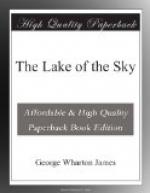this trench we look, and opposite upon the eastern
wall and crests, as we ride out to the eastern
edge of the western summit. In a stretch
of forty miles the chasm of it bursts into view
at once, half of which is a plain sprinkled with
groves of pine, and the other half an expanse of level
blue that mocks the azure into which its guardian
towers soar. This is Lake Tahoe, an Indian
name which signifies “High Water.”
We descend steadily by the winding mountain-road, more
than three miles to the plain, by which we drive
to the shore of the Lake; but it is truly Tahoe,
“High Water.” For we stand more
than a mile, I believe more than six thousand feet
above the sea, when we have gone down from the
pass to its sparkling beach. It has about
the same altitude as the Lake of Mount Cenis (6280
feet) in Switzerland, and there is only one sheet
of water in Europe that can claim a greater elevation
(Lake Po de Vanasque, 7271 feet). There are
several, however, that surpass it in the great
mountain-chains of the Andes and of Hindustan.
The Andes support a lake at 12,000 feet above the
sea, and one of the slopes of the Himalaya, in Thibet,
encloses and upholds a cup of crystal water 15,600
feet above the level of the Indian Ocean, covering
an area, too, of 250 square miles. I had
supposed, however, that within the immense limits
of the American Republic, or north of us on the continent,
there is no sheet of water that competes with Tahoe
in altitude and interest. But in Mariposa
County of our State there are two lakes, both
small,—one 8300 feet, and the other 11,000
feet,—on the Sierra above the line of the
sea.
To a wearied frame and tired mind what refreshment there is in the neighborhood of this lake! The air is singularly searching and strengthening. The noble pines, not obstructed by underbrush, enrich the slightest breeze with aroma and music. Grand peaks rise around, on which the eye can admire the sternness of everlasting crags and the equal permanence of delicate and feathery snow. Then there is the sense of seclusion from the haunts and cares of men, of being upheld on the immense billow of the Sierra, at an elevation near the line of perpetual snow, yet finding the air genial, and the loneliness clothed with the charm of feeling the sense of the mystery of the mountain heights, the part of a chain that link the two polar seas, and of the mystery of the water poured into the granite bowl, whose rim is chased with the splendor of perpetual frost, and whose bounty, flowing into the Truckee stream, finds no outlet into the ocean, but sinks again into the land.
Everything is charming in the surroundings of the mountain Lake; but as soon as one walks to the beach of it, and surveys its expanse, it is the color, or rather the colors, spread out before the eye, which holds it with greatest fascination. I was able to stay eight days in all, amidst that calm and cheer, yet the hues of the water seemed




